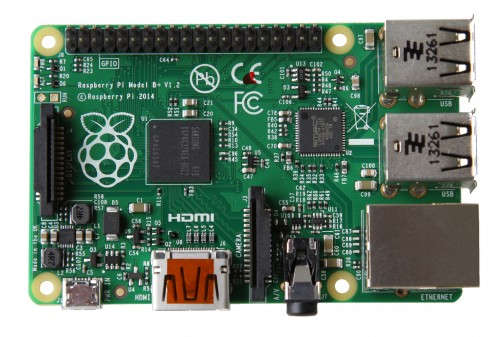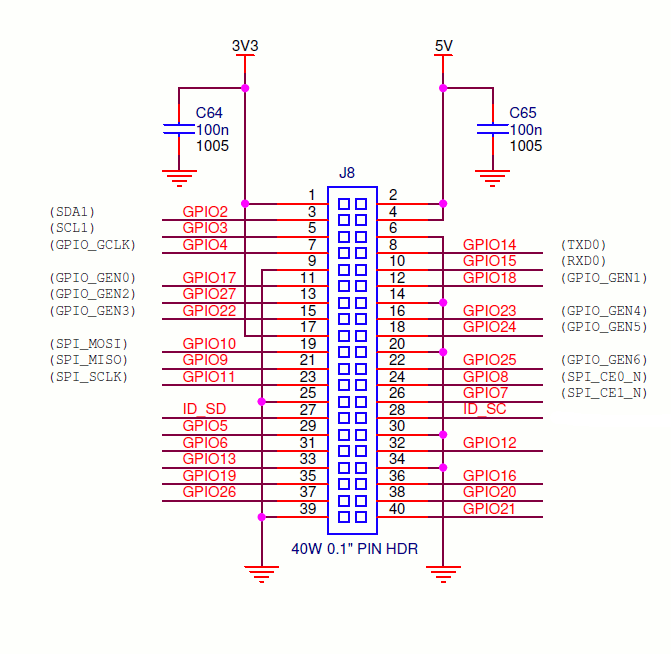| New Raspberry Pi B+ |
| Written by Harry Fairhead | |||
| Monday, 14 July 2014 | |||
|
The Raspberry Pi foundation has just announced the Raspberry Pi B+. The short version is - better spec and the same price. The Raspberry Pi has been an unimaginable success. You might have thought that it would sell a million if you waited long enough but the number currently stands at 2 million and that equates to a turnover of 1 Million Pis a year.,
The Pi might be successful but there is always room for improvement. The new Raspberry Pi B+ isn't a radical redesign - more an evolutionary tweak. The basic specs haven't changed much, same BC2835 and 512MB of RAM and the $35 price tag. Take a look at the official launch video:
The Raspberry Pi blog sums up the changes as:
The really good news is that the GPIO has been expanded in a backward compatible way. You can still plug your existing GPIO headers and cables into the left-hand end of the new 40-pin plug without having to make any changes.
The new GPIO has some interesting features. As well as some additional general purpose lines there are two designated for use with I2C EEPROM. When the Pi boots it will look for custom EEPROMs on these lines and optionally use them to load Linux drivers or setup expansion boards. What this means is that expansion boards can now include identity chips that, when the board is connected, configures the Pi to make use of them - no more manual customization. Of course we will have to wait for board manufacturers to make the necessary changes. The other nice features are the four USB sockets, making it possible to have a keyboard, mouse and WiFi dongle without the need for a hub and still have one USB connection left over. The micro SD socket means that no longer will we have to go though the common, but ludicrous, act of putting a micro SD into a full size adaptor and then plugging it in. A micro SD is also more physically part of the hardware for embedded applications. Reducing the power consumption by 0.5 to 1W is going to be something that keeps the technical forums busy. The problem of powering a Pi from batteries is challenging and dropping the average 2W power consumption to 1W or even 1.5W will increase battery life, but probably not enough for many applications. The actually power consumption of a Pi depends on what you have connected to it, what it is doing and what measures you have taken to turn off hardware you are not using. However, the power consumption reduction does bring the model B into the same area as the lower power model A. Finally, it looks as if case manufacturers are going to have to retool. The overall board is the same size but the connectors are very different. The four holes in the PCB mean that you can mount the Pi without needing to invent custom clips for the board - in particular it means you can put the Pi into an off the shelf wall mounting box. Apparently the original model B will be kept in production as long as there is a demand. You can order the B+ immediately from the usual sources. There is currently no word on what will happen to the much simpler model A.
More InformationRelated ArticlesIs This What It Now Means To Build A Computer? Buy A Pi For $25 And Get Mathematica Free Raspberry Pi To Star In Class? Raspberry Pi Gets A $25 Camera Web IDE The Easiest Way To Program Raspberry Pi Raspberry Pi or Programming - What shall we teach the children?
To be informed about new articles on I Programmer, install the I Programmer Toolbar, subscribe to the RSS feed, follow us on, Twitter, Facebook, Google+ or Linkedin, or sign up for our weekly newsletter.
Comments
or email your comment to: comments@i-programmer.info
|
|||
| Last Updated ( Saturday, 17 November 2018 ) |



